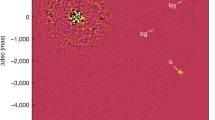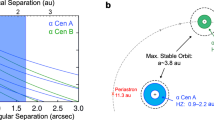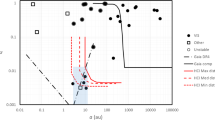Abstract
The Solar System is our only example of a planetary system, and the Earth is the only known instance of a planet harbouring life. The formation of planetary systems may occur commonly among stars like the Sun, but whether life arises frequently, rarely, or is a unique event is more problematical. Astrometric techniques capable of detecting major planets (similar to Jupiter, Saturn and Uranus) orbiting nearby stars are currently active1–4, but detection of an Earth-like planet is beyond current techniques. Direct imaging of planetary systems (refs 5, 6; B. M. Oliver, unpublished data) is even more challenging, and current opinion seems to have dismissed the possibility of imaging a planet as small as the Earth. The problem is not an impossible one, however: by combining radioastronomy and optical methods, images of Earth-like planets orbiting nearby stars should be obtainable, and their atmospheres could be studied spectroscopically for evidence of life.
This is a preview of subscription content, access via your institution
Access options
Subscribe to this journal
Receive 51 print issues and online access
$199.00 per year
only $3.90 per issue
Buy this article
- Purchase on Springer Link
- Instant access to full article PDF
Prices may be subject to local taxes which are calculated during checkout
Similar content being viewed by others
References
Black, D. C. Bull Am. astr. Soc. 16, 767–769 (1984).
Shao, M. et al. Bull. Am. astr. Soc. 16, 750–757 (1984).
York, D. G. et al. Bull. Am. astr. Soc. 16, 775 (1984).
Reasenberg, R. D. Bull. Am. astr. Soc. 16, 758–766 (1984).
Ken Knight, R. G. Icarus 36, 422–423 (1978).
Bracewell, R. N. & MacPhie, R. H. Icarus 38, 136–147 (1979).
Ryle, M. & Hewish, A. Mon. Not. R. astr. Soc. 120, 220–230 (1960).
Ryle, M. Nature 239, 435–438 (1972).
Napier, P. J., Thompson, A. R. & Ekers, R. D. Proc. IEEE 71, 1295–1320 (1983).
Burke, B.F. Eur. Space Ag. spec. Publ. 226, 177–183 (1985).
Reasenberg, R. D. (ed.) Bull Am. astr. Soc. 16, 747–837 (1984).
Eur. Space Ag. spec. Publ. 226 (1985).
Labeyrie, A. in Optical and Infrared Telescopes for the 1990s (ed. Hewitt, A.) 786–788 (Kitt Peak National Observatory, Tucson, 1980).
Stachnik, R. & Labeyrie, A. Sky Telesc. 67, 205–209 (1984).
Ruze, J. Proc. IEEE 54, 633–640 (1966).
Mauron, N. thesis, Univ. Marseilles (1984).
Cloud, P. Am. Scient. 62, 54–66 (1974).
Owen, T. in Strategies for Search for Life in the Universe (ed. Papagiannis, M. D.) 177–185 (Reidel, Dordrecht, 1980).
Margulis, L. & Lovelock, J.E. Icarus 21, 471–480 (1974).
Papagiannis, M. IAU Trans., 323–329 (1982).
Author information
Authors and Affiliations
Rights and permissions
About this article
Cite this article
Burke, B. Detection of planetary systems and the search for evidence of life. Nature 322, 340–341 (1986). https://doi.org/10.1038/322340a0
Received:
Accepted:
Issue Date:
DOI: https://doi.org/10.1038/322340a0
This article is cited by
-
Detection of ozone on Saturn's satellites Rhea and Dione
Nature (1997)
-
Efficient detection of brown dwarfs using methane-band imaging
Nature (1996)
-
Ground-based imaging of extrasolar planets using adaptive optics
Nature (1994)
-
Extrasolar planet detection
Astrophysics and Space Science (1994)
Comments
By submitting a comment you agree to abide by our Terms and Community Guidelines. If you find something abusive or that does not comply with our terms or guidelines please flag it as inappropriate.



